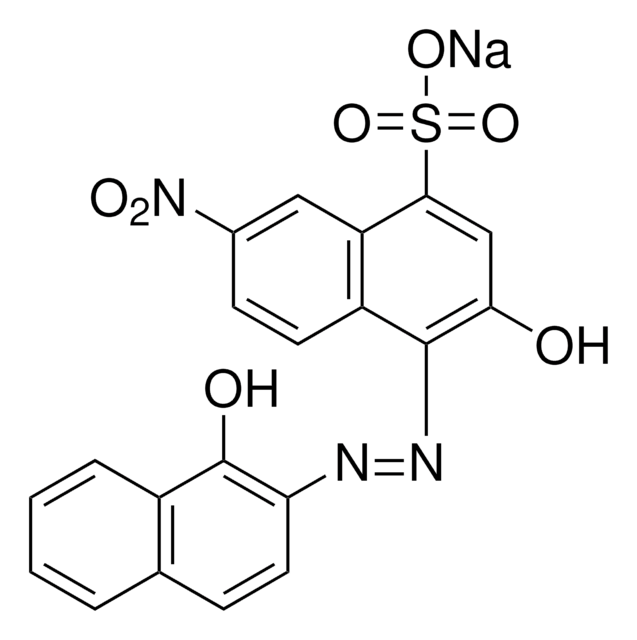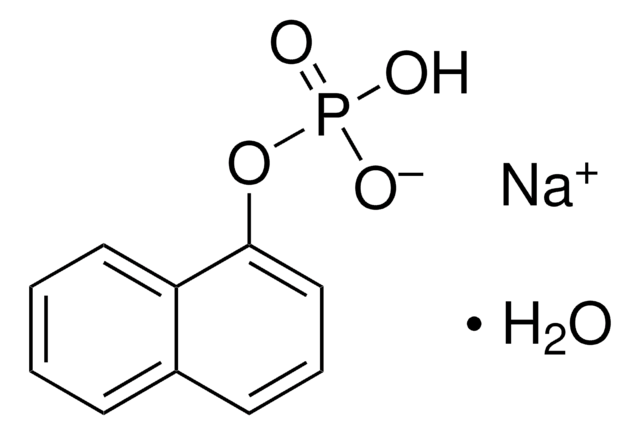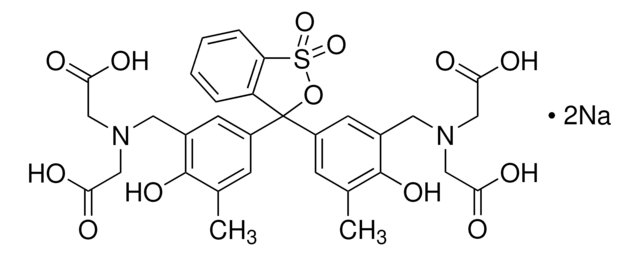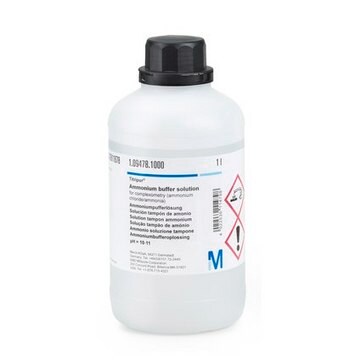1.03168
Eriochrome blue-black B (C.I. 14640)
metal indicator
Synonym(s):
Eriochrome blue-black B (C.I. 14640), 2-Hydroxy-1-(1-hydroxy-2-naphthylazo)-naphthalene-4-sulfonic acid sodium salt
About This Item
Recommended Products
Product Name
Eriochrome blue-black B (C.I. 14640), metal indicator
Quality Level
form
solid
potency
>5000 mg/kg LD50, oral (Rat)
loss
≤10% loss on drying, 110°C
pH
9.5 (20 °C, 10 g/L in H2O)
solubility
20 g/L
bulk density
540 kg/m3
λmax
634-644 nm (buffer pH 10.0)
storage temp.
15-25°C
InChI
1S/C20H14N2O5S.Na/c23-17-11-18(28(25,26)27)14-7-3-4-8-15(14)19(17)22-21-16-10-9-12-5-1-2-6-13(12)20(16)24;/h1-11,21,24H,(H,25,26,27);/q;+1/p-1/b22-19-;
InChI key
YRFCCVCSEVISHI-GXTSIBQPSA-M
Application
- New palladium-oxazoline complexes: Synthesis and evaluation of the optical properties and the catalytic power during the oxidation of textile dyes.: This study examines new palladium-oxazoline complexes, focusing on their synthesis and evaluation of their optical properties and catalytic power in the oxidation of textile dyes, including Eriochrome Blue-Black B (Hassani et al., 2015).
- Wet air and catalytic wet air oxidation of several azodyes from wastewaters: the beneficial role of catalysis.: This research explores the application of wet air and catalytic wet air oxidation processes to degrade various azo dyes in wastewaters, highlighting the positive impact of catalysis in enhancing degradation efficiency, potentially applicable to Eriochrome Blue-Black B (Rodríguez et al., 2009).
Analysis Note
Absorption maximum λmax. (buffer pH 10.0): 634 - 644 nm
Spec. Absorptivity A 1%/1cm (λmax; 0.025 g/l; buffer pH 10.0; calculated on anhydrous substance): 220 - 320
Loss on drying (110 °C): ≤ 10 %
Suitability as indicator (for metal titration): passes test
Signal Word
Warning
Hazard Statements
Precautionary Statements
Hazard Classifications
Eye Irrit. 2
Storage Class Code
11 - Combustible Solids
WGK
WGK 3
Flash Point(F)
Not applicable
Flash Point(C)
Not applicable
Certificates of Analysis (COA)
Search for Certificates of Analysis (COA) by entering the products Lot/Batch Number. Lot and Batch Numbers can be found on a product’s label following the words ‘Lot’ or ‘Batch’.
Already Own This Product?
Find documentation for the products that you have recently purchased in the Document Library.
Customers Also Viewed
Our team of scientists has experience in all areas of research including Life Science, Material Science, Chemical Synthesis, Chromatography, Analytical and many others.
Contact Technical Service









